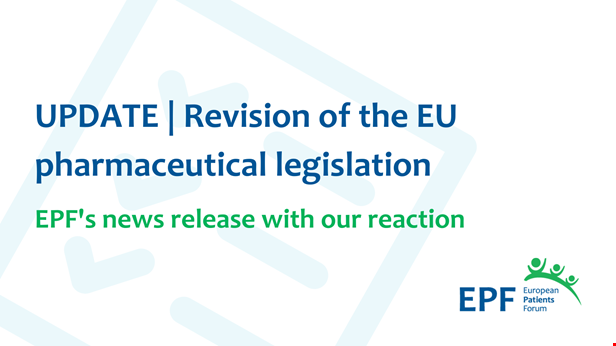EPF's reaction to pharmaceutical legislation revision

Today, the European Commission has released the long-awaited revision of the EU pharmaceutical legislation. This revision represents a once-in-a-generation opportunity to make the EU regulatory framework more patient-centred by promoting patient involvement in the regulatory process, improving access to medicines, and developing new medicines that better address unmet medical needs. Read our reaction and find the full download below.
The European Patients’ Forum (EPF) welcomes the long-awaited revision of the EU pharmaceutical legislation. This is a once-in-a-generation opportunity to make the EU regulatory framework more person-centred by promoting patient involvement in the regulatory process, improving access to and availability of medicines and developing new treatments to better address unmet patient needs. Ultimately, pharmaceutical rules should meet the needs of those who will benefit from approved medicines: the patients.
Make the EU a leader in patient involvement
We support the proposals to promote patient involvement in the regulatory lifecycle of medicines, such as the representation of patient organisations in the Committee for Medicinal Products for Human Use and the support scheme for non-profit entities. We call on further efforts to involve patients and their representatives throughout all the development and evaluation cycle. Patient involvement improves the outcome of regulatory decisions, ultimately contributing to the quality of the evaluation of medicines and their outcomes. The attractiveness of the European continent should not only be based on its capacity for innovation but also on its rigorous involvement of patients in the regulatory process for medicines.
This is why we call on the legislators to strengthen the meaningful patient involvement in several parts of the legislation. The definition of ‘unmet medical need’ should be created in cooperation with patients and include criteria important to them, such as quality of life. Patients should also be involved in the development of the AMR awareness card. In this respect, and as with the package leaflet, information should be available in both paper and electronic form to ensure accessibility to people who do not have access to the Internet or whose digital literacy is limited.
Increase patient access to safe and efficient medicines
We welcome the proposals to strengthen incentives for faster launch and early access to medicines for patients and call on the industry to take advantage of these proposals for the benefit of patients. We note that the total duration of incentives, should the necessary conditions be met (launch, comparative trials, meeting unmet needs, investing in research for new indications), is similar or can be higher than the current levels, while promoting earlier access. We also call on Member States to meet their responsibilities of ensuring the availability of and access to medicines for patients and provide effective universal health coverage.
In addition, faster approval of medicines, introduced with regulatory sandboxes and temporary emergency authorisations, could be beneficial for patients who would have faster access to the medicines and treatments they need, but this should not indicate a lower level of patient safety and standards of evidence.
Medicines shortages remain a threat to patient care. We welcome the introduction of measures including early notifications, shortage prevention plans, and a publicly available database of shortages. We believe the role of patients in reporting shortage events should be strengthened.
Antimicrobials are a crucial part of patients’ safety. Incentives for the development of and access to effective novel antibiotics should decouple revenues from sales volumes. We remain concerned about the introduction of transferable exclusivity vouchers, even as we recognise that measures were proposed to increase the predictability of their use. We have concerns about their effectiveness in practice, the predictability of their use and costs, and potential risks to access for patients.
Engaging in meaningful dialogue with the patient community will be essential to ensure that the revision meets the needs of patients. EPF is committed to being a strong and constructive partner in the legislative process and to continuing its reflections with the EU institutions, the patient community and other stakeholders.
Read the entire press release here.
